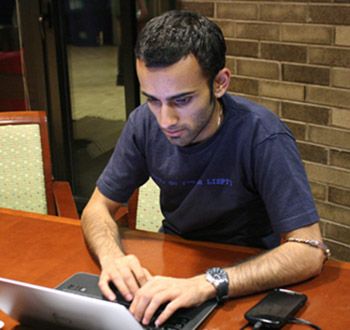Here are some things every international applicant must bear in mind before finalising the college and course of your choice.
 A shadow of uncertainty, accompanied by confusion, will always loom over the last year of school in every student’s life who has to make one of the most difficult choices that will eventually shape his or her career and life.
A shadow of uncertainty, accompanied by confusion, will always loom over the last year of school in every student’s life who has to make one of the most difficult choices that will eventually shape his or her career and life.
Though the decision to pick the right university for higher education can be tricky, considering the right factors can simplify this conundrum.
Prior to picking the right university, it is imperative that you deliberate upon the major you will opt for in college.
There are three aspects of this decision that you would have to weigh in to make an appropriate choice -- namely skills, interests and values.
It is important to understand your skills and interests as well as understanding their value in the profession which will ultimately help in defining your goals.
While there are those who make up their minds early on in life about the profession they would want to get into and make it their goal to work towards their ambitions, there are others who juggle between multiple interest areas.
If you belong in the second category, it is a good idea to consult a career counsellor, your teachers or even professionals who work in your field of interest to seek clarity on the same.
Research
There is no dearth of resources for information about the course you wish to apply for as well as the career you wish to pursue and help you make a confident and informed choice.
This kind of research and self-analysis takes time and is not one to leave till the last minute.
Plan and set deadlines
Once you have made up your mind, you should make a timeline or chart for yourself.
Deadlines can vary and preparing a list of the universities you are planning to send applications to will keep you organised.
A timeline also helps in planning the statement of purpose (SOP) that will be sent with the application.
Work on your SOP
A rushed Statement Of Purpose is easy to spot since they maybe riddled with spelling mistakes, grammatical errors as well as a weak structure.
You could also ask your teacher to have a look at it before submitting the application.
Extra care needs to taken to check that the SOPs are customised as per the requirements of every university that you apply to.
Mistakes in the SOP will certainly disappoint the college committee and will give an impression of an irresponsible attitude on your part.
It is imperative that you proofread the application a couple of times before you click on the submit button.
Pick the right college for you
The list of do’s are accompanied by things to not do while considering the colleges to apply for.
Going to college is a stepping stone to your career and the people you meet along the way will influence your life.
It is thus not sensible to pick a university your friends have applied to as well.
A university that is right for your friend may not necessarily be right for you as well.
Though the idea of going to a university where you know no one may be intimidating, you will make new friends eventually.
The application form
The application form is probably the most crucial step of the process and errors in the form will not be taken lightly by universities.
Apart from a careful study of the application form of each of the universities you apply for, it is important to understand the requirements of the questions and ensure that the answers don’t exceed the word limit.
It is also advisable to make a checklist for the documents for each of the universities and double check each document before sending out the correspondence.
Universities prefer to take students who are well-rounded individuals who will participate in activities apart from lectures.
Make sure that you mention extra-curricular activities in your application.
Recommendation letters
Additionally, plan the recommendation letters in advance which is another key component of your application.
Late submissions or an average recommendation can lead to rejections. In order to avoid such a situation, approach the recommenders you have in mind early so that you don’t miss out on the chance of getting a detailed letter highlighting your strengths and accomplishments.
Keep all documents ready
Another key element of the application process is to get your grades converted into GPAs on time.
Apart from CBSE, ICSE, IGCSE and IB, every state in India has a separate board of education with varying grading systems.
For universities, the scores need to be converted into Cumulative Grade Points Average (CGPA) for which you should stick to authorised and reputed third party evaluators and refrain from doing it yourself using online conversion.
Clean up your social profile
A valuable tip to remember is to cleanse your profiles on social media like Facebook, Twitter, YouTube, and any other internet information of any questionable content.
Such instances of remarks and photographs have the potential to be perceived negatively.
They reflect badly on your personality and may sabotage your chances of admission at your dream college.
All said and done, even after you have checked off all the components of sending the application, things don’t often work out the way we want them to.
It is important to not be disheartened if you don’t get selected in your dream college.
You should go ahead and pick a college which perhaps ranks lower in your list of preferences but it will add experience to your academic life nonetheless.
Your performance in college counts for more than just the brand of a particular university.
There also might be the bleak possibility that you may not be selected in any of the colleges which are offering your preferred course.
Students also often face doubts about their choices of picking the appropriate major in college.
The decision is not and should not be that hard on a student just out of school and the course you pursue in college does not necessarily determine the profession you will eventually pick.
Studies have shown that within 10 years after graduation most people are working in careers that are not directly connected to their undergraduate majors.
Students change their minds about their majors during college years, much like people change fields after spending years in a particular profession.
With new types of jobs emerging every year, most of us have no way of knowing where we will find ourselves in the future.
So keep an open mind and remember that after the years you spend in college you will emerge rich with experience and a new perspective ready to take on the world.
Fatima Agarkar is an educationist and the co-founder of JBCN Education.
Lead image used for representational purposes only. Image: Matylda Czarnecka/Creative Commons











 © 2025
© 2025